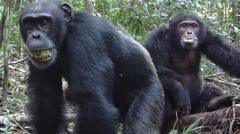
Chimps drinking a lager a day in ripe fruit, study finds
Scientists say chimps consume the equivalent of a bottle of lager a day from dining on ripe fruit.

Scientists say chimps consume the equivalent of a bottle of lager a day from dining on ripe fruit.
Researchers have uncovered intriguing insights into the dietary habits of chimpanzees, revealing that these primates may consume the equivalent of a bottle of lager daily through their natural diet of ripe fruit. This finding sheds light on the foraging behaviors of chimpanzees and their potential interactions with fermented foods in the wild. The study, which highlights the chimps’ preference for fruits that have begun to ferment, raises questions about the effects of such consumption on their behavior and social dynamics.
The research, conducted in a natural habitat in Uganda, involved extensive observation of a group of chimpanzees over an 18-month period. Scientists noted that the chimps often targeted specific fruits, such as figs, which contained high levels of sugar. As these fruits ripen, they undergo fermentation, leading to the production of alcohol. The researchers estimated that the chimps could ingest up to 3.5 percent alcohol from their fruit diet, akin to the alcohol content found in beer. This discovery aligns with previous findings regarding other animal species that consume fermented fruits, suggesting a broader ecological understanding of fermentation in the animal kingdom.
The implications of this study extend beyond mere dietary preferences. The consumption of fermented fruit may influence the chimps' social behaviors and interactions. Alcohol consumption is known to alter behavior in many species, and it is plausible that the chimps experience similar effects. Researchers are particularly interested in how the availability of fermented fruits might affect group dynamics, mating behaviors, and even hierarchical structures within chimp communities.
Moreover, this study raises questions about the evolutionary aspects of alcohol consumption among primates. The ability to metabolize alcohol could provide advantages in certain ecological contexts, particularly where food sources are abundant and varied. Understanding how chimpanzees and other primates have adapted to their environments may offer insights into the evolutionary pathways of early humans, who also relied on fruit-based diets.
In addition to the scientific implications, the findings have garnered attention from conservationists and animal behaviorists. The study underscores the importance of preserving natural habitats where chimps can access a diverse range of fruits, including those that ferment. Habitat destruction and climate change pose significant threats to these ecosystems, and protecting them is crucial for maintaining the health and behavior of chimpanzee populations.
As the research continues, scientists plan to explore how these dietary habits might affect the chimps' cognitive functions and decision-making processes. Future studies may also examine whether other primates exhibit similar behaviors and what this means for our understanding of primate intelligence and culture. The notion that non-human animals engage with substances that alter their states of mind opens up a fascinating area of inquiry about cognition, social structures, and evolutionary biology.
In light of these findings, there is a growing dialogue within the scientific community about the broader ecological implications of alcohol consumption in the animal kingdom. This research could pave the way for further studies on the interactions between animals and their environments, particularly in relation to the availability of natural resources and how they shape behavior and social systems.
As scientists continue to investigate the nuances of chimpanzee behavior and diet, the public's interest in these findings highlights the importance of understanding our closest relatives in the animal kingdom. The study not only enriches our knowledge of chimpanzees but also encourages a deeper appreciation for the complexities of wildlife and the environments they inhabit. Discussions surrounding this topic are likely to continue, inviting further exploration into the fascinating lives of primates and their interactions with fermented foods.